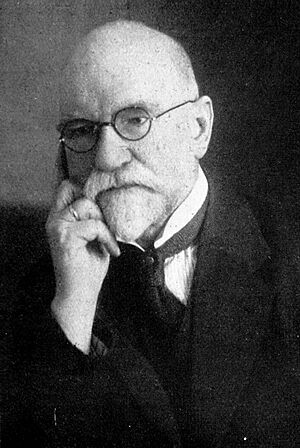Paul Rohrbach facts for kids
Paul Rohrbach (born June 29, 1869 – died July 19, 1956) was a writer from the Baltic German community. He was very interested in how countries around the world interacted, which he called "world politics." He was born in a place called Irgen manor, in what is now Skrunda Municipality, Latvia. At that time, it was part of the Russian Empire. Between 1887 and 1896, he studied at several universities, including the University of Dorpat, Berlin, and Strasbourg.
Paul Rohrbach's Life and Work
Rohrbach traveled a lot, visiting places like Asia (especially China) and Africa. From 1903 to 1906, he worked as a Settlement Commissioner in Southwest Africa. This job involved helping people settle in the colony. After he returned to Berlin, he became a teacher. He taught about the economy of colonies at a special business school in Berlin.
He wrote many books about the political situations in the countries he visited. He paid a lot of attention to how German colonization and interests affected these places. Some of his books were translated into English. For example, his book Der deutsche Gedanke in der Welt became German World Policies in English. Another book, Der Krieg und die deutsche Politik, was translated as Germany's Isolation: An Exposition of the Economic Causes of the Great War. Most of this last book was written before the First World War began.
Rohrbach held very harmful views. He believed that Black societies in Africa could not create advanced cultures or political systems. Because of this, he thought Germans were right to take and use land and labor in Africa that he considered "underused."
He supported harsh systems where native Africans were forced to work in Germany's colonies. He also encouraged colonial governments to take land from local people and give it to white settlers. Rohrbach thought African labor was very important for the colonial economy. He wanted to keep the local populations alive. However, he also suggested that settlers and colonial governments should use violence to stop any resistance from native people. He even approved of destroying rebellious African tribes.
German Foreign Policy Views
Rohrbach also wrote a lot about Germany's foreign policy, especially during the First World War. He became an important public voice in Germany's discussions about what the country wanted to achieve in the war. He even helped with talks about these goals within the German government.
Rohrbach strongly believed that Germany should expand its power into Eastern Europe. He thought this should happen at the expense of the Russian Empire. However, he did not think that the colonial system used in Africa would work for governing the areas and people of Eastern Europe.
Rohrbach suggested that the German Empire should directly take over the Russian areas along the Baltic Coast. These areas included Kovno, Vilna, Courland, Livonia, and Estonia. He recommended using education and settlement plans to slowly make the Estonian, Latvian, Lithuanian, and White Ruthenian people more German.
He also strongly supported Germany taking control of Congress Poland. But he believed that the Polish nation was too politically and culturally developed to be simply taken over and Germanized. Instead, he supported creating an independent Polish state. This state would manage its own internal affairs. However, it would follow the German Empire's lead on foreign policy and military matters. The German Empire followed this plan in 1916 when it created the Kingdom of Poland.
See also
- German-Armenian Society
 This article incorporates text from a publication now in the public domain: "article name needed". New International Encyclopedia. (1905).
This article incorporates text from a publication now in the public domain: "article name needed". New International Encyclopedia. (1905).
 | Frances Mary Albrier |
 | Whitney Young |
 | Muhammad Ali |


